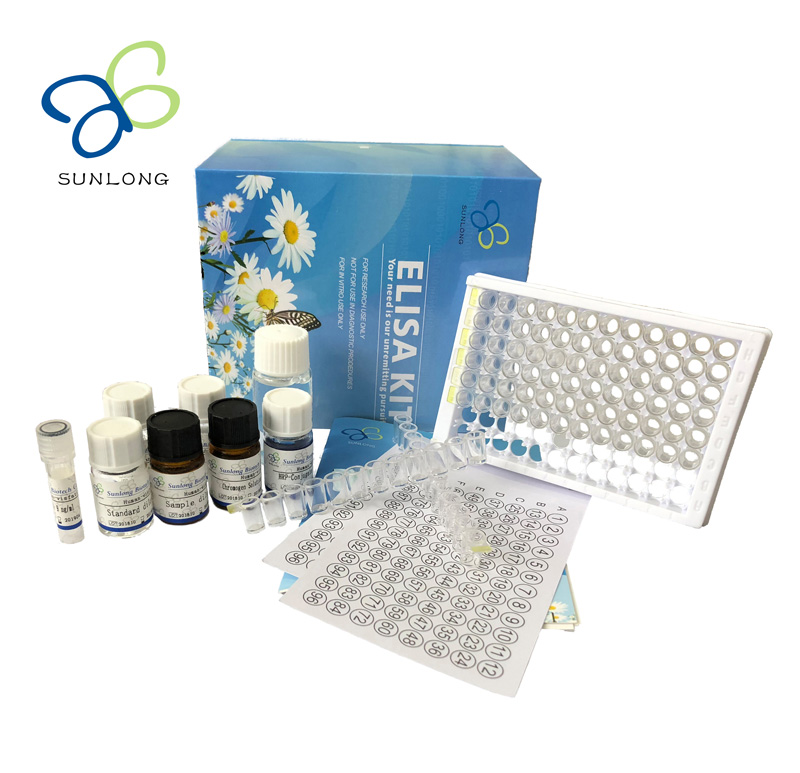Human C-Reactive Protein, CRP ELISA Kit
Catalog No :
CAS Number :
Brand :
In Stock
Assay range:9 pg/ml -800pg/ml
Sensitivity:2.2 pg/ml
Standard:1080 pg/m
Sample Volume:50ul
Wavelength:450nm
Specifications:
| Application | ELISA-Based Assays |
| Storage Temperature | 2-8°C |
| Product Type | Elisa Kit |
| Product Brand | SUNLONG BIOTECH |
| Product Grade | Molecular Biology |
Human C-Reactive Protein (CRP) ELISA Kit
The Human C-Reactive Protein (CRP) ELISA Kit is designed for the quantitative determination of CRP levels in human serum, plasma, urine, culture media, and other biological fluids. This kit uses a highly sensitive and specific Sandwich-ELISA technique to detect CRP, a vital biomarker for inflammation, infection, and tissue injury.
Sample Preparation
1. Serum Preparation:
- Collect whole blood and allow it to clot at room temperature (10–20 minutes).
- Centrifuge at 2,000–3,000 rpm for 20 minutes to separate serum.
- If precipitates appear during storage, centrifuge the sample again before use.
2. Plasma Preparation:
- Collect blood in tubes containing anticoagulants such as EDTA or citrate.
- Incubate at room temperature for 10–20 minutes.
- Centrifuge at 2,000–3,000 rpm for 20 minutes to obtain plasma.
- Re-centrifuge if any precipitates are observed.
3. Urine Samples:
- Collect urine in aseptic tubes.
- Centrifuge at 2,000–3,000 rpm for 20 minutes and carefully collect the supernatant.
- Re-centrifuge if precipitates form during storage.
4. Cell Samples:
- For cell secretions, collect the culture supernatant in aseptic tubes.
- Centrifuge at 2,000–3,000 rpm for 20 minutes to remove debris.
- For intracellular components, dilute cells to 1×10⁷/mL in PBS (pH 7.2–7.4), then disrupt cells by repeated freeze-thaw cycles. Centrifuge as above and collect the supernatant.
5. Tissue Samples:
- Cut, weigh, and freeze tissue in liquid nitrogen. Store at -80°C until use.
- Homogenize tissue in PBS (pH 7.4) at 4°C.
- Centrifuge at 2,000–3,000 rpm for 20 minutes and collect the supernatant for immediate use or storage.
Important Notes
- Perform sample extraction and ELISA assays as soon as possible after collection.
- Store samples at -20°C if immediate testing is not feasible. Avoid repeated freeze-thaw cycles.
- Avoid using samples containing sodium azide (NaN₃), as it inhibits HRP activity.
Key Features
- High Sensitivity and Specificity:
- Accurately detects low levels of CRP in biological samples.
- Wide Sample Compatibility:
- Validated for serum, plasma, urine, cell culture supernatants, and tissue homogenates.
- Quantitative Results:
- Provides precise measurement of CRP using a standard curve.
- Ease of Use:
- Pre-coated plates and ready-to-use reagents simplify assay preparation.
- Reproducibility:
- Ensures consistent results across multiple experiments.
Applications
- Inflammation Research:
- Study CRP as a biomarker for inflammation and tissue injury.
- Infectious Disease Monitoring:
- Assess CRP levels during bacterial, viral, or other infections.
- Cardiovascular Studies:
- Investigate CRP's role in cardiovascular diseases.
- Autoimmune Disorders:
- Evaluate CRP in autoimmune conditions like rheumatoid arthritis and lupus.
- Clinical Diagnostics:
- Aid in diagnosing inflammatory and infectious diseases.
Kit Components
- Pre-coated Microelisa strip plate.
- CRP standards for standard curve generation.
- HRP-conjugated CRP detection antibody.
- TMB substrate solution.
- Stop solution.
- Wash buffer.
- Sample diluent.
- Instruction manual.
Assay Principle
The assay is based on the Sandwich-ELISA technique:
- Pre-Coated Plate:
- Microtiter plate wells are pre-coated with an antibody specific to CRP.
- Sample and Standard Addition:
- Standards or samples are added, allowing CRP in the sample to bind to the immobilized antibody.
- HRP-Conjugated Detection:
- A Horseradish Peroxidase (HRP)-conjugated antibody is added, forming a sandwich complex.
- Washing Step:
- Unbound components are washed away to minimize background interference.
- Substrate Reaction:
- TMB substrate solution reacts with HRP, producing a blue color in positive wells.
- Stop Reaction and Measurement:
- A stop solution is added, turning the color yellow. Optical density (OD) is measured at 450 nm.
- Quantification:
- CRP concentrations are calculated by comparing OD values to the standard curve.
Storage and Stability
- Store all kit components at 2–8°C to maintain reagent integrity.
- Avoid prolonged exposure to light and repeated freeze-thaw cycles.
Advantages
- Accurate and Reliable:
- High specificity for CRP ensures minimal cross-reactivity.
- Convenient:
- Ready-to-use reagents reduce preparation time.
- Reproducible:
- Delivers consistent results for reliable data interpretation.
- Versatile:
- Suitable for various biological sample types and research needs.
The Human C-Reactive Protein (CRP) ELISA Kit provides a robust, sensitive, and specific method for measuring CRP in biological fluids. Its simplicity, accuracy, and versatility make it an invaluable tool for research and clinical diagnostics in inflammation, cardiovascular diseases, and immune system disorders.




 0
0
